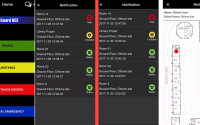5+ Best Programming Languages for Mobile App development
Make hay while the sun shines. There will not be a better time to create mobile apps than now, demand for mobile applications has increased rapidly over the last few years and would continue for the years to come. Android and iOS are the leading platforms in the market and the official programming languages for native apps development are Java and Swift (& Objective-C) respectively.
Mobile apps development using native languages is not always the best option, and for that reason, individual app developers as well as organizations use C#, JavaScript, C++ and other languages for hybrid and cross platform mobile apps development.
Some of the key factors that influence choice of a specific programming language over the other include –
- Overall mobile app development strategy – native, cross platform, hybrid etc.
- Skill set of the development team
- Target app users
- Intended platform support
- Specific needs of the application.
- App category – Utility, games, B2B or B2C etc.
There are many programming languages used for mobile app development these days including Java, C++, C#, JavaScript, Swift and Objective C to name a few.
Do not miss to check out this latest and greatest course (have a look for sure) – The complete iOS 11 & Swift Developer Course – Build 20 Apps. In this course, you will use Xcode 9 and Swift 4 to make real apps like Instagram and Uber with ARKit and CoreML.
You might also like – Learn Ionic 3 From Scratch – Building Cross Platform Mobile Apps.
Which Programming Language fits your Mobile App Development Strategy?
This is something that you need to answer. The key decision to make is your overall development approach, whether you want to go for hybrid apps, native apps or cross platform development using tools like Xamarin, Titanium Appcelerator, Phonegap or Codename One etc. This is not always the first decision though, since skill set of the team tends to govern the selection of development strategy and/or development tools and platforms.
In short, there is no universal criterion or process that can be followed to select the programming language for your mobile development endeavor.
Many web developers these days simply choose JavaScript and HTML5 to develop hybrid apps that run on Android, iOS and other platforms. They key reason to make this choice is prior knowledge of the existing technologies used for web development..
On the other end of the spectrum are developers who love to work with platform specific native programming languages like Swift (for iOS) for best performance, features support and seamless end user experience.
If we look at Android apps development space, Java is the preferred languages, but java is neither the only language for Android development nor is the best fit for all android app categories and the same goes for Swift when it comes to iOS apps development.
For a game developer, going with Unity game engine which supports C# and JavaScript as scripting languages is a much better option than struggling with Java, C++ or Swift.
In this article, we will review different programming languages used for mobile app development. We will also see the effectiveness of these languages for developing business apps, enterprise apps, games, utility apps and everything else mobile.
Java
Java has been the language for masses since decades and was mainly used for web and enterprise applications development. However, Java started to reign the world of Android apps development soon after Google released android as open source back in 2008. Though Android API is not exactly Java but is mostly Java and similar, and for that reason many (including me) prefer to call it Java.
The use of Java in mobile app development space is huge, given the fact that around 60% of mobile phones market belongs to Android as of writing this article. Android market is expected to grow further and even if languages like C++ gain further ground in Android development, java is expected to keep the leader tag for years to come.
While Java is the official language for Android and is heavily used for Android apps development, it can also be used for cross platform apps development. You can write apps in java and compile your apps to run on iOS (iPhone, iPad) and other mobile platforms.
JUniversal, RoboVM and CodeNameOne are few options to develop cross platform apps (including iOS apps) using Java.
Talking a bit more about java, It is a high level compiled language and people across the globe use Java for developing Android apps of all types, may it be games, utility apps, music, video apps, enterprise apps, shopping apps and everything else Android.
Write once and run everywhere is the philosophy on which java was released back in 1990 by Sun Microsystems, acquired later by Oracle. Java also happens to be the language which is much easier to learn, has a great community support, tons of open source libraries, frameworks and great documentation.
Read more about Java here at – Java for Everyone.
JavaScript+HTML5
Many iOS and Android developers love to work with native libraries and native languages like Swift, Objective-C and Java to create mobile apps, but that is neither always the best choice nor the effective use of time and effort.
There are advantages of using platform specific languages for native application development but there are disadvantages too, the biggest disadvantage is the need to build same mobile app separately for iOS, Android, Windows and other platforms. This is where programming languages like C# and JavaScript come to the rescue and are used for building cross platform and hybrid apps respectively.
The lethal combo of JavaScript and HTML5 has taken hybrid mobile apps development to a level beyond imagination. The one key reason is that hybrid app development using JavaScript frameworks and HTML5 markup is the easiest option for old time web developers to enter the world of mobile apps development.
HTML5 based JavaScript mobile UI frameworks like Ionic let you create hybrid mobile apps with native look and feel by using age old CSS, JavaScript and HTML. In the recent times, the rise of React Native has taken JavaScript to the world of cross platform native apps development for Android and iOS.
JavaScript has a great application in mobile games development as well. Unity 3D which is the leading games engine has JavaScript as one of its scripting options along with C# and unity script.
You might want to check out – JavaScript based hybrid app development frameworks.
Swift
Swift is the language for developing everything Apple (iOS and OSX) and is the top choice of developers for native iPhone, iPad and iPod apps development.
Swift was first released by Apple in June 2014 as an Apple proprietary language and was later made open source in December, 2015. The popularity of Swift has been rising leaps and bounds ever after it was made open source and its ecosystem is growing like a wildfire.
Swift is now available on Linux for development and chances are that Google might adopt Swift for Android development too. If Swift happens to be the development language for Android, iOS and OSX, then Swift without doubt would lead the market of mobile app development with margins.
Swift is easy to learn language, offers easy syntax, like scripting languages and provides features and performance of low level languages like C. As of writing this article, Swift has playgrounds for Xcode which means that you can write code and see the output right there on the screen, much like any scripting languages.
Swift is fast adopted by Enterprises for mobile apps development which is quite evident from the fact that companies like IBM have released development tools for Swift that makes learning easy and development faster. You can develop, test and release an enterprise ready mobile app within no time. .
Swift is great option for games development too being a fast, accessible and safe, offers great platform performance, specifically for Apple hardware as of now.
Check out Swift Tutorials here – Swift Tutorials
Check out Xcode Tutorials here – Xcode Tutorials
C#
C# is one of the most preferred languages for developing cross platform mobile application, developers can write iOS, Android and windows Phone apps in C# with support of cross platform tools like Xamarin and Unity games engine.
C# is the brainchild of Microsoft architect Anders Hejlsberg and first appeared back in 2000. It is one of the most versatile languages till date and brings in the ease of programming offered by high level languages like Java.
Two of the most popular platforms that support mobile apps development with C# are Xamarin and Unity games engine. Xamarin lets you write app code in C# language and compile to platform specific packages and binaries, a single code base gives you native iOS, Android, Windows as well as Mac app.
With the rise of Xamarin in recent times, C# is fast becoming the language of choice for building enterprise applications, business apps, utility apps, productivity apps as well as games.
On the other end of the spectrum is the leading games engine, Unity. Unity has given all the fame to C# in the world of games development. Though Unity supports JavaScript and unity script too, but C# being a versatile language shines the most. This gives an edge to C# developers and let them write the game code once to build games for iOS, Android, Xbox and other platforms.
C# is type-safe, object oriented programming language and runs in the .Net Framework run-time, and C# code is compiled into IL (intermediate language) that conforms to CLI specifications.
C# is from the house of Microsoft, like Swift is from the house of Apple and we expect to see both these languages rule the world of mobile apps development for years to come. Both these languages are mighty promising and hold all cards to be on top of all charts.
You can read more about C# here at – C# Programming guide.
C++
C++ is one of the most performant languages, being close to the hardware, and is not as difficult as its ancestor C. C++ lives deep into the Microsoft ecosystem with Visual studio supporting it since beginning, and for that reason, there is no dearth of developers, development tools and great documentation.
C++ along with C has always been the leader in the area of hard core systems programming, and looking at the current state of affairs, C++ is gaining grounds in the world of mobile apps development too.
If we talk about Android development where Java rules, C++ is also making its presence felt after Google added support for Native development Kit (NDK). NDK supports C/C++ in Android apps development and lets you develop code that is performant than java code by all means, no garbage collection – if you remember.
Microsoft on the other hand has also enhanced Visual Studio and added support to compile C++ code directly to Android native code. It also added Android Emulator to help apps development.
Coming to iOS development, C++ works with objective-C and you can use C++ libraries in your iOS apps development. C++ libraries can also be included in Swift code and used as it is.
If your strategy is to write only native apps for both Android and iOS, common libraries written in C++ can be used in both Android as well as in Swift and objective-c, it can lead to saving on development effort and overall time to market.
Coming to the world of games development, there are tons of C++ libraries and resources that can be plugged into your code and compiled to native iOS and Android games. Very popular platform QT also offers cross platform applications development, libraries are provided in C++.and there are platform specific SDK.
Read more about C++ here at – cplusplus official website
Objective C
Objective C has been the language of choice for Apple mobile apps development for long but is slowly getting replaced by Swift. New developers prefer to learn Swift but since the ecosystem of Objective C has been huge it is hard to get this one out of sight that easily. It still continues to be one of the top languages for mobile apps development, with millions of existing apps made and maintained in objective-C
There are also some proprietary programming languages like Apex used for all applications development on force.com platform provided by Salesforce. Salesforce itself is huge and for that reason, use of Apex cannot be undermined in the mobile app development space.
The aforesaid programming languages are the mainstream languages, other options like Node.js, Python, PHP, Go and other languages are also used heavily in the background.
You might also like – Popular Programming Languages.
Conclusion
Though there are many programming languages out there in the wild but there are only a few that are versatile, powerful and widely supported for mobile applications development. Take example of any kind of app, a general purpose app, an enterprise app, a game or a utility app, you would find that directly or indirectly, it is developed with one of the six language options listed in this article.
There are some alternatives too but with limited capacity. For example, Dot it yourself (DIY) drag and drop tools let you create mobile apps without the need for coding, but then these tools can be used to create only simple apps, using pre created UI Kits, templates etc. Not to say, those tools too are developed mostly using C, C++ only.
Do share your experience with various programming languages used for mobile apps development, with our readers, via comments. Cheers!
Further Reading –
Cordova vs React Native vs Xamarin.
JavaScript Alternative Programming Languages
Recommended Course – The Complete Android N Developer Course.
Source
http://noeticforce.com/best-programming-languages-for-mobile-apps-development


